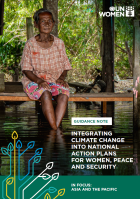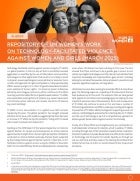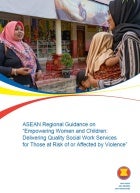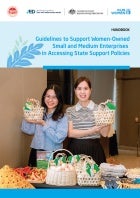Date:
The report found that while a conducive policy environment is in place to promote greater participation of women in conflict/crisis prevention, there are gaps between policies and their implementation and a need for coordination mechanisms, capacity-building and additional financial and human resources.
Date:
Women and girls are at heightened risk of gender-based violence, trafficking, and exploitation—exacerbated by displacement, lack of safe shelter, and lack of access to protection services.
Date:
Over 17 million people have been affected, including 8.8 million women and girls. An estimated 4.8 million women and girls were living in the worst-affected areas.
Date:
As part of UN Women's commitment to advancing gender equality and women’s economic empowerment, the Research-in-Action series explores the transformative potential of caring cities—urban environments that invest in care systems.
Date:
This UN Women Guidance Note provides practical, evidence-based guidance on integrating climate change into National Action Plans (NAPs) on Women, Peace and Security (WPS).
Date:
The summary report outlines findings from the baseline study conducted to implement the Strategic Note 2023–2027, which guides the UN Women's work in Nepal. Divided into four outcomes, the report examines the current state of women's rights and gender equality
Date:
Even before the earthquake, more than a third of Myanmar’s people—including 10.4 million women and girls—needed urgent humanitarian aid. The earthquakes add another layer of hardship as they face unsafe conditions, disrupted health services, and heightened risks of gender-based violence and exploitation—especially for girls separated from their families.
Date:
Ageing populations and declining fertility rates are reshaping economic and social landscapes in China, Japan, the Republic of Korea, and Thailand. It highlights the urgent need to integrate gender-responsive strategies into policy responses and share promising practices with a focus on advancing women’s economic empowerment.
Date:
This repository reflects UN Women’s work addressing a critical and growing form of violence that disproportionately affects women and girls worldwide. Technology-facilitated violence against women and girls (TF VAWG) includes any act committed or amplified through digital means, leading to physical, sexual, psychological, economic, or social harm.
Date:
This report, “Content Analysis of Gender Representation in Advertising in China,” is an essential first step to identify how these media-driven stereotypes manifest in China and what can be done to address them. By shedding light on the urgent need for action, this report also contributes to the broader goals of the United Nations Sustainable Development Cooperation Framework (2021–2025
Date:
The Gender Analysis Bangladesh 2024 provides an evidence-based assessment of the gendered dimensions of the unrest, examining its impact on women, girls, gender-diverse individuals, and other marginalised groups. Drawing on qualitative and quantitative data collected from 24 districts across the country.
Date:
Heading into 2025, we are about to commemorate the thirtieth anniversary of the Beijing Declaration and Platform for Action (Beijing+30). Adopted by 189 countries at the Fourth World Conference on Women in 1995, it is one of the most comprehensive blueprints for gender equality and women’s empowerment ever created.
Date:
This Regional Guidance aims to support policymakers and members of the social service workforce and allied sectors in ASEAN Member States (AMS) to design and deliver quality social work services for women and children at risk of or who have experienced violence.
Date:
These initiatives have deepened participants' understanding of regional and national migration policies, equipping them to align their advocacy efforts with international frameworks on gender equality, decent work, and sustainable development.
Date:
Discover how UN Women drives change through targeted interventions and partnerships that provide Afghan women with the tools and resources they need to thrive.
Date:
It presents findings from a legislative review, stakeholder mapping, and capacity assessment to inform the development of GRP policies and programs. Despite growing efforts to support Women-Owned Businesses (WOBs) and Gender-Responsive Enterprises (GREs).
Date:
Tailored to the Vietnamese business landscape, this handbook serves as both a practical guide and a source of inspiration, empowering women-led small and medium enterprises (SMEs) to confidently expand their businesses and access domestic and international markets.
Date:
This report assesses the capacity and needs of stakeholders in advancing Supplier Diversity and Gender-Responsive Procurement (SD-GRP) in Viet Nam. It provides key recommendations to enhance market access for Women-Owned Businesses (WOBs) and Gender-Responsive Enterprises (GREs).
Date:
This is a crucial document that represents a collective voice, uniting women from different backgrounds and generations.
Date:
This handbook is a practical guide for women-owned SMEs in Viet Nam to navigate and benefit from state support policies. It provides detailed information on available assistance, eligibility criteria, and application processes.

![[cover]](/sites/default/files/styles/search_image_140px/public/2025-04/id-20250388448-cover_policy-research_960px.jpg?itok=dBh1IamY)
![[cover]](/sites/default/files/styles/search_image_140px/public/2025-04/mn-20250388119-myanmarearthquakegendersnapshot-01-960px.jpg?itok=gtt6hhfp)
![[cover]](/sites/default/files/styles/search_image_140px/public/2025-04/mn-20250388119-myanmarearthquakegenderimpact-flash-update-2-1-960px.jpg?itok=Bd4uX3ul)


![[cover]](/sites/default/files/styles/search_image_140px/public/2025-04/np-20250385755-baseline-study-report-07042025-website-960px.jpg?itok=VxHBLOYs)
![[cover]](/sites/default/files/styles/search_image_140px/public/2025-04/mn-giha-wg-gender-impact-flash-update-1_myanmar-earthquake-960px.jpg?itok=_N_r61T0)
![[cover]](/sites/default/files/styles/search_image_140px/public/2025-03/ap-20250383318-2025-ageing-societies-960px.jpg?itok=7o6QMYm5)

![[cover]](/sites/default/files/styles/search_image_140px/public/2025-03/cn-20250380578-content-analysis-of-genderrepresentationinadvertisingin-china-960px.jpg?itok=1vhCHp8l)
![[cover]](/sites/default/files/styles/search_image_140px/public/2025-03/np-c1521-rapid-gender-analysis-juldec24-960px.jpg?itok=xUEAahDh)
![[cover]](/sites/default/files/styles/search_image_140px/public/2025-03/cn-c1515-en_unwomenchina-newsletter2024-960px.jpg?itok=5te-4pFb)

![[cover]](/sites/default/files/styles/search_image_140px/public/2025-02/ap-c1489-enhancing-engagement-of-womens-rights-organi-960px.jpg?itok=jD-F2xaK)
![[cover]](/sites/default/files/styles/search_image_140px/public/2025-02/af-c1472-wee-unw-aco-2pg-brochure-960px.jpg?itok=aFpKq3rw)
![[cover]](/sites/default/files/styles/search_image_140px/public/2025-02/vn-c1464-report_grp-vietnam-960px.jpg?itok=VthSpE6w)
![[cover]](/sites/default/files/styles/search_image_140px/public/2025-02/vn-e-commerce-handbook-eng_960px.jpg?itok=WBiRyuxg)
![[cover]](/sites/default/files/styles/search_image_140px/public/2025-02/vn-c1462-grp-assessment-of-capacity-cover-960px.jpg?itok=Bkt5oC35)
![[cover]](/sites/default/files/styles/search_image_140px/public/2025-02/bd-c1460-charter-of-demands_eng_960px.jpg?itok=Lx9iXXPQ)
